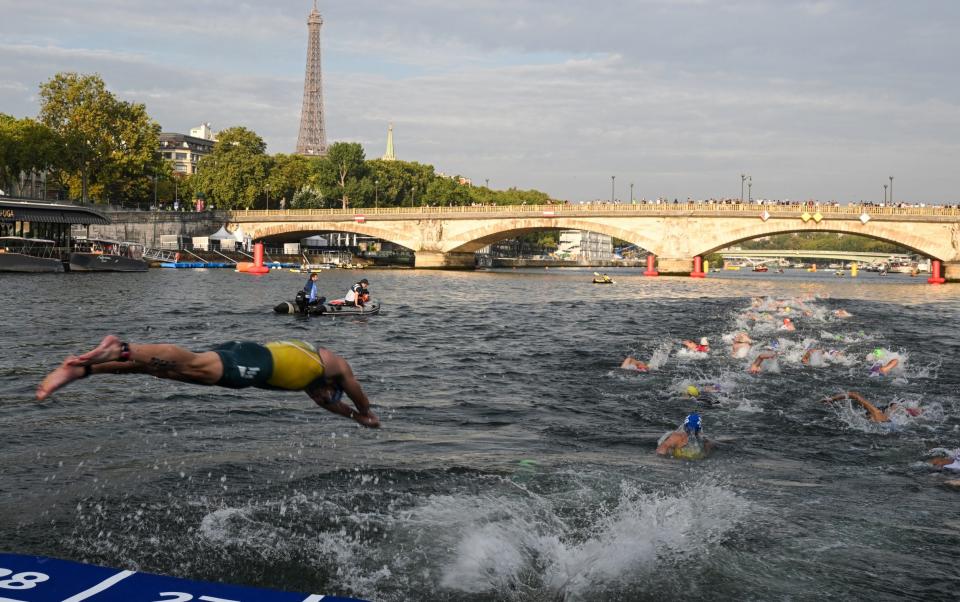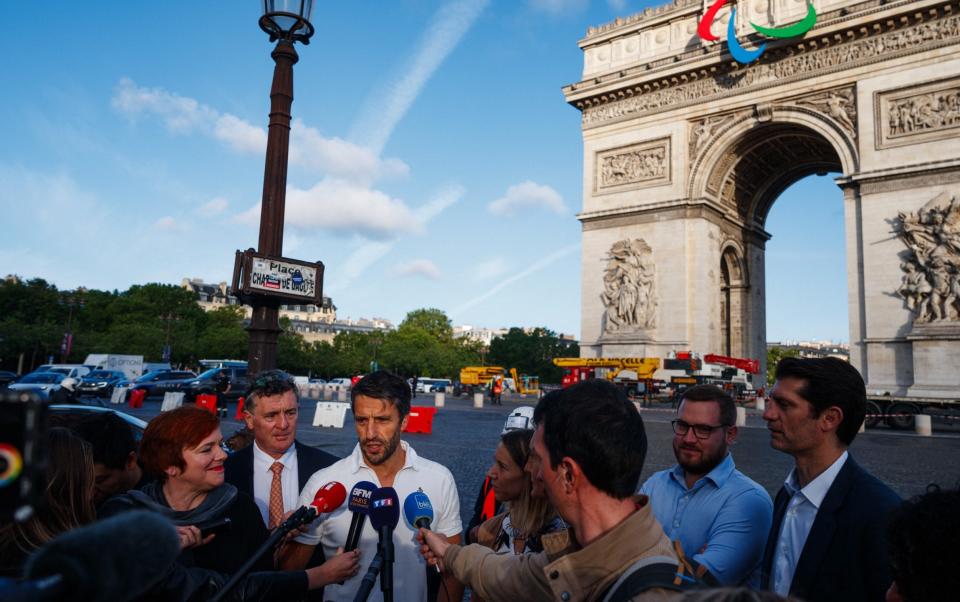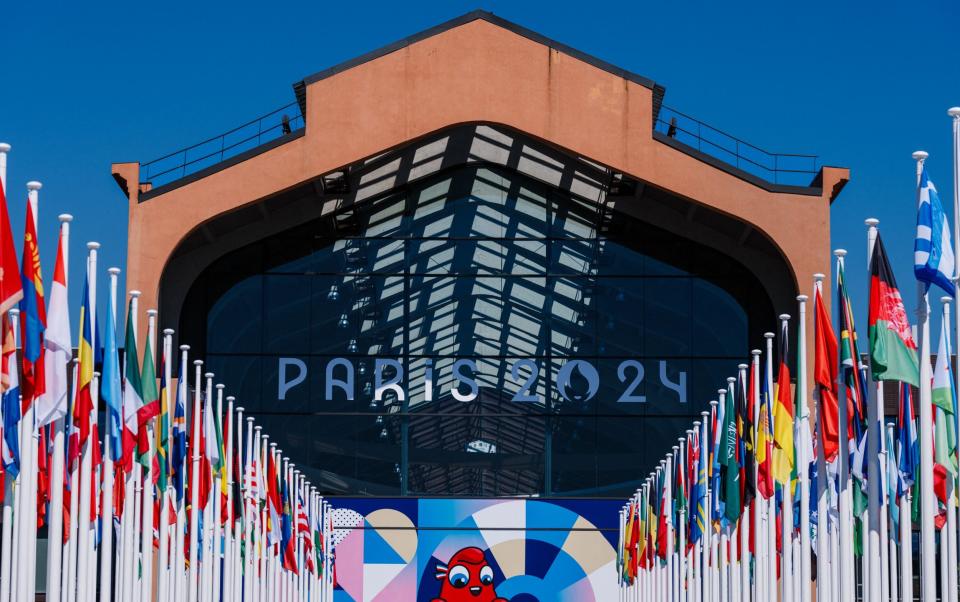O Paris Olympic Games was driven by a major improvement in the water quality of the River Seine, making it sufficient to safely carry out both triathlon and open water swimming.
With just 25 days left until the opening ceremony traveling down the iconic river, it is understood that new readings from the last 72 hours have finally produced pollution markers that would be acceptable to the competition.
These improvements are expected to be officially reported by the Paris mayor’s office next Friday. There follows a period from mid-June of minimal rainfall, higher temperatures and the full operation of a new storage basin with capacity for 50 thousand cubic meters of rain.
This in turn followed rain during March, April and May, which was among the highest ever recorded in Paris and raised concerns that the Olympic triathlon could be reduced for the first time to a running and cycling-only duathlon. .
French authorities have spent €1.4 billion trying to clean the river, improving Paris’ sewage system and building new water treatment plants, but persistent rain, as well as a lack of sunlight, are still causing huge difficulties.
On Friday, the office of the mayor of Paris released readings for June 18 that showed that levels of the bacteria E.coli – an indicator of fecal matter – were around 10 times above the maximum limits imposed by sports federations. . While the better news comes as a considerable relief to participants who have spent years planning the peak for a specific date, they also know that more heavy rain could suddenly change things again.


With a team rotation to follow the individual events, Team GB triathletes will take a series of risk mitigation measures. These include continued consumption of foods and probiotics rich in “friendly bacteria,” preventative antibiotics and stomach medications, extensive disinfection of wetsuits, and hygiene measures that mean no eating or drinking before major post-race sanitization. There is even a strategy to minimize athletes’ exposure to water – and therefore risk – by potentially using coaches for pre-race reconnaissance.
Paris 2024 organizers said test results are released every Friday by the Paris mayor’s office, but confirmed a delay between the collection of water samples and the publication of the results. A spokesperson said: “We are confident that the return of good weather, combined with the excellent work carried out by authorities to clear the Seine, will allow open water swimming events to take place during the Games.”
With less than a month until the start of the Olympics, here’s how Paris is shaping up…
Snap election increases planning problems
France had already spent years planning an Olympic opening ceremony of unprecedented complexity, at a time of unique global and internal political tension. And then President Emmanuel Macron abruptly announced early general elections that, in his own words, could trigger a “civil war” if the far-right National Rally or the far-left Unsubmissive France prevailed.
It is no wonder, then, that this dramatic gamble should arouse considerable concern.
“I had a very, very difficult time with the announcement – why ruin this beautiful moment with this election decided at the last minute, without consulting anyone?” said Paris Mayor Anne Hidalgo. For all the frustration with the way politics has come to dominate the national discourse, as a unique celebration is about to begin, there is confidence that seven years of security and counter-terrorism planning will meet the challenge in a successful way. robust.
The first test will perhaps also be the biggest: a floating Olympic opening ceremony up to six kilometers from the River Seine, during which 45,000 police will be deployed, at a ratio of around one for every four or five spectators. The measures will extend to blocking and security “sweeping” a protected circuit from Ivry-Charenton to Pont Gariglian several days in advance. Specialist state forces – expected to include police helicopters, divers and snipers – will be used to protect the river and airspace and there will be around 2,000 private security guards concentrated on the lower piers and the Trocadéro.
In short, it is the largest security operation ever for any event in French history.
Although there are contingencies – namely limiting the opening ceremony to the Trocadéro area – Macron has repeatedly stressed that threats and risks should not prevent France from “creating dreams” with its inauguration. Asked about the impact of the elections, a Paris 2024 spokesperson said: “All the main decisions were made a long time ago. The State is obviously a fundamental player, but we know that we can count on its full involvement and that of our public services, even in the context of these early elections, to move forward on the remaining issues.”
Legacy of games at stake in River’s role
What was supposed to become perhaps the most lasting legacy of Paris 2024 – the first chance in more than a century for Parisians to safely swim the Seine – has felt almost like a game of dare in recent weeks.
Macron had long promised to join Paris Mayor Anne Hidalgo on the famous river, but that was postponed until July 14 after water quality readings remained stubbornly below the required range.
Tony Estanguet, president of Paris 2024, managed to get into the water at last summer’s test event, although his past life as a three-time Olympic canoeing champion perhaps helped alleviate reservations. “I’m not very objective because I row on rivers that are actually more polluted than the River Seine,” he said, before asking, with a smile, about the quality of the River Thames.
Estanguet acknowledged, however, that the risk for both triathlon and open water swimming events has become one of the biggest challenges. The British team is preparing for uncertainty that could last until the morning of the race. “We plan a triathlon – but we have to make decisions quickly all the time,” said Mike Cavendish, GB performance director.


Mitigations for last year’s Paris test event even included using coaches to swim a recce that would normally take place about 48 hours before the race. “If the water is terrible, no one will swim because health comes first,” Cavendish told The Telegraph. “But we’ll probably tell the athletes ‘it’s not worth the risk’ and hire some coaches. Flow rates are very high at the moment because of the rain, so there is a lot to learn from getting on the water.”
Concerns about water and heat have become increasingly common in sport and British Triathlon is among the government bodies that have joined a “clean water alliance” to raise awareness among governments and water authorities. “We lost a lot more races than in the previous [Olympic] cycle,” said Cavendish. “To think that, potentially 15, 20, 30 years from now, we could end up in a scenario where we have to compete in swimming pools, is not something we really want to consider. As humans, we need to protect our natural world so we can continue to do the things we love; this is not just the water, but the climate in general.
“That’s why the fact that Paris is trying to do this in the Seine, as a legacy for the local population, is extremely important. If the rain stops, if it’s generally dry from this point on, I’ll still be relatively confident. If there is heavy rain between now and then – certainly in the days before – it will be more complicated.”
Transportation Challenges Spark Concern
Politics and Euro 2024 may be dominating conversations in France right now, but you don’t need long in Paris to know you’re in an Olympic city. Queues form daily beside the Eiffel Tower to take a photograph of the enormous Olympic rings that now hang from what is both the city’s most famous landmark and the setting for beach volleyball. New temporary Olympic venues are visible from the Arc de Triomphe to the Place de la Concorde, while existing main stadiums – such as the Stade de France and Arena La Defense – have been adapted respectively for athletics and swimming.
Of the 10 million tickets on sale, 8.4 million were sold, with the majority of tickets available for football matches in larger stadiums outside of Paris. Organizers promise a complete Stade de France for athletics
Apart from the French, the most supported team in Paris will be Team GB, with UK fans buying more than half a million tickets.


There are concerns, however, about transport accessibility and French charity AFP France Handicap has criticized the “scandalous” lack of improvements to the Paris metro. Organizers believe an underground road network of buses and taxis will act as a viable option during a time when traffic is low and many Parisians leave the city. They also insist that they have learned from the serious security problems that marred the 2022 Champions League final and that continued dialogue with the famously active French unions will dissuade any disruption. “The French people are known for their vibrant and dynamic democracy,” said Etienne Thobois, chief executive of Paris 2024. “We have worked with the unions since day one and are confident that the Games as such will not be targeted.”
A spokesperson added: “More than ever during this period, we will be committed to making the Games, the Games of all French people, a unifying sporting event. With just a few weeks to go, we are ready to hold the Games.”



































